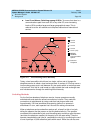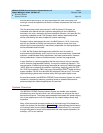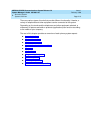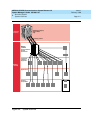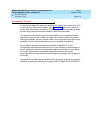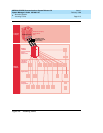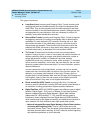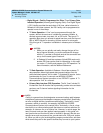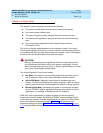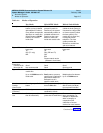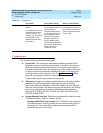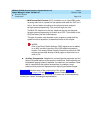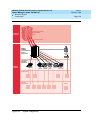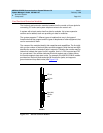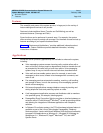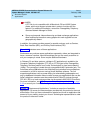
MERLIN LEGEND Communications System Release 6.0
System Manager’s Guide
555-660-118
Issue 1
February 1998
About the System
Page 2-16Modes of Operation
2
Modes of Operation 2
The system’s mode of operation determines the following:
■ The types of outside trunks that can be connected to the system
■ How users access outside trunks
■ The types of system operator consoles that your business can use
■ The features and applications that your business can use and how they
work
■ How the system is registered with the Federal Communications
Commission (FCC)
The choice of system mode depends on your company’s needs. Your Lucent
Technologies representative and you or your company’s representative decide on
the system mode when you plan and purchase your system. Lucent Technologies
personnel then set the mode when they install the system.
CAUTION:
!
Because the operating mode significantly affects how the system works,
you should know the mode in which your system is configured. You can
either check the
Planning Forms
(Form 1, Page 2, System Mode) or contact
your Lucent Technologies representative
.
The system operates in one of three modes:
■ Key Mode. The simplest way to provide people with more than one line
from a telephone. Easy to use. Recommended for smaller systems.
■ Hybrid/PBX Mode. Especially useful where toll fraud/security are a
concern. Provides cost-effective call routing, especially useful for special-
purpose network services. Recommended for medium to larger systems.
■ Behind Switch Mode. Used when the system is connected to a system
such as DEFINITY. May be appropriate for users who are part of a large
organization, for example, a department within a company.
While Key mode is appropriate for smaller systems and has the capacity
limitations of any key system, the MERLIN LEGEND Communications System,
unlike other key systems, is flexible and allows you to expand to a PBX system
when your business outgrows Key mode. Table 2–1
outlines the primary
differences among the modes. “Line Buttons on Multiline Telephones” on page
3–25 describes Shared Access (SA) buttons and Intercom (ICOM) buttons.



